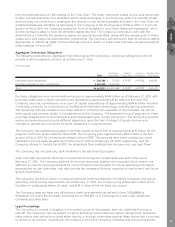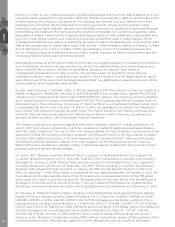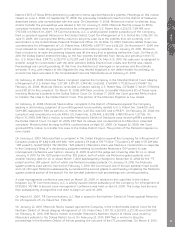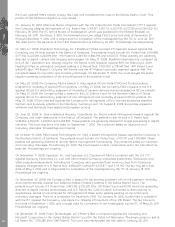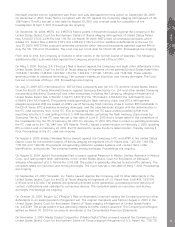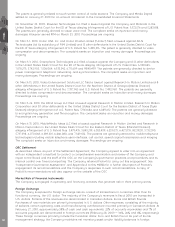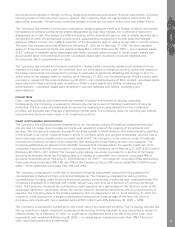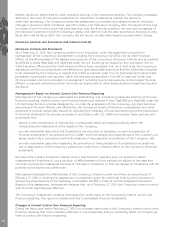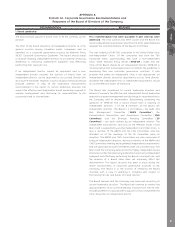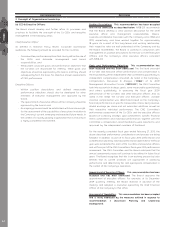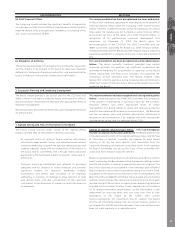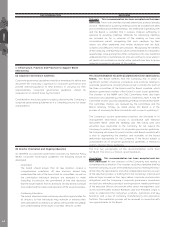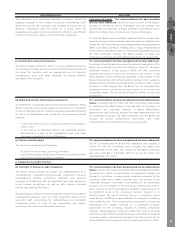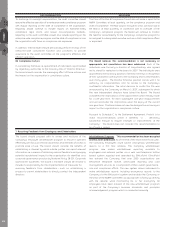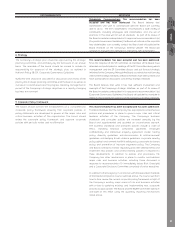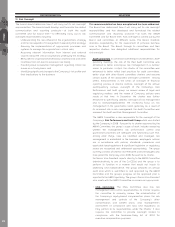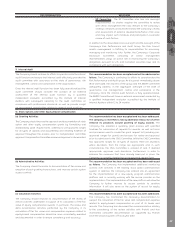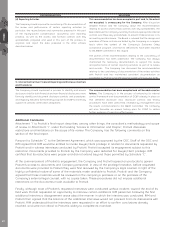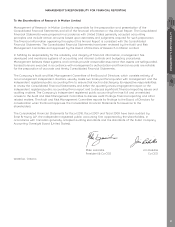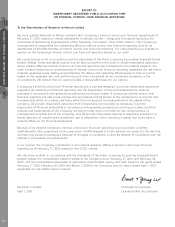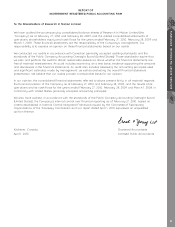Blackberry 2010 Annual Report Download - page 51
Download and view the complete annual report
Please find page 51 of the 2010 Blackberry annual report below. You can navigate through the pages in the report by either clicking on the pages listed below, or by using the keyword search tool below to find specific information within the annual report.
RECOMMENDATION RESPONSE
(b) Chief Financial Officer
The Company should consider the significant benefits of appointing
an individual as Chief Financial Officer. The individual should have the
requisite stature, skills and experience needed for a company of the
size, scope and potential of RIM.
This recommendation has been accepted and has been addressed.
In March 2007, the Board appointed Mr. Brian Bidulka to the position of
Chief Accounting Officer when the Company’s then Chief Financial
Officer moved to a different position within the Company. For almost
three years, Mr. Bidulka was the Company’s senior financial officer
and carried out most of the duties of a Chief Financial Officer. In
recognition of his performance, personal development and
experience, on December 17, 2009 the Board, upon the
recommendation of the Co-CEOs, the CNG Committee and the
A&RM Committee, appointed Mr. Bidulka as Chief Financial Officer.
The Board believes that Mr. Bidulka has the requisite stature, skills and
experience needed for a company of the size, scope and potential of
RIM.
(c) Delegation of Authority
The authorities delegated to management for binding the corporation
and the matters to be brought to the board for approval should be
defined in a “statement of approval authorities” and approved by the
board of directors, with periodic review and re-affirmation.
This recommendation has been accepted and will be addressed as
follows. The Board currently maintains oversight over certain
corporate activities. For example, all significant acquisitions are
presented to the Board for consideration or approval, as the Board
deems appropriate. The Board also considers and approves the
Company’s annual operating plan. The Board, however, does
believe that a formal approval policy is appropriate and intends to
adopt such a policy in the near future, which will be subject to periodic
review by the Board.
3. Succession Planning and Leadership Development
The Board should develop a succession plan for the CEO level and
define criteria to be used in selecting future chief executive officers.
Succession plans should also be developed for appropriate levels of
executive management.
Succession plans should be reviewed and approved by the board on
an annual basis.
This recommendation has been accepted and is being addressed as
follows. Under the supervision of the CNG Committee, the Company is
in the process of developing a succession plan for the Co-CEOs,
executive officers and other appropriate levels of senior
management. The Board intends to review and approve succession
plans for the executive officer level on an annual basis. The Board will
use the succession plan and position descriptions referenced in
response to recommendation 2 (a), together with other appropriate
considerations at the time, for selecting future CEOs.
4. Agenda Setting and Flow of Information to the Board
The board should exercise better control of the agenda-setting
process and the flow of information it receives as follows:
- An oversight matrix (a listing of board activities with related
information requirements, timing and expected board action)
should be developed to govern the agenda-setting process and
meeting calendar, along with the related flow of information to
the board and its committees. The oversight matrix should be
approved by the board and subject to periodic review and re-
affirmation.
- Protocols should be established and adhered to, providing
adequate time for directors to review materials and consider
significant matters for approval, especially material
transactions and events, with circulation of all materials
sufficiently in advance of meetings to allow directors to read
and absorb them, with due consideration of their personal
contribution to the discussion of matters on which the board is
to deliberate.
Control of Agenda and Oversight Matrix: This recommendation
has been accepted and has been addressed. The Board believes that
it has appropriate control of the agenda setting process and the flow
of information it receives. Currently, the agenda for each Board
meeting is set by the lead director, with assistance from the
Corporate Secretary and relevant committee chairs. Draft agendas
for Board committees are set by the Chair of the committee with
assistance from relevant corporate officers.
Based on its experience and service as directors and officers at other
public companies, the Board believes that the agenda-setting process
and the information it receives is appropriate and not atypical. The
Board has observed an improvement in the timeliness and content of
Board materials since a new Corporate Secretary was hired in 2008.
In addition to the above and in response to the recommendation, the
Board, the CNG and A&RM Committees have adopted annual meeting
planners which indicate their respective activities for each fiscal year
and the timing of the activities, including those required by the Board
mandate and committee charters. These calendars do not include a
list of related information requirements, as this information is well
understood for recurring items and can vary from time to time
depending on the nature of the matter, then current
facts/circumstances, the information and its content. The Board
and the SP Committee believe that an annual meeting planner is
not required for the SP Committee because it has a narrow focus and
does not meet regularly on a quarterly basis.
MD&A
43


